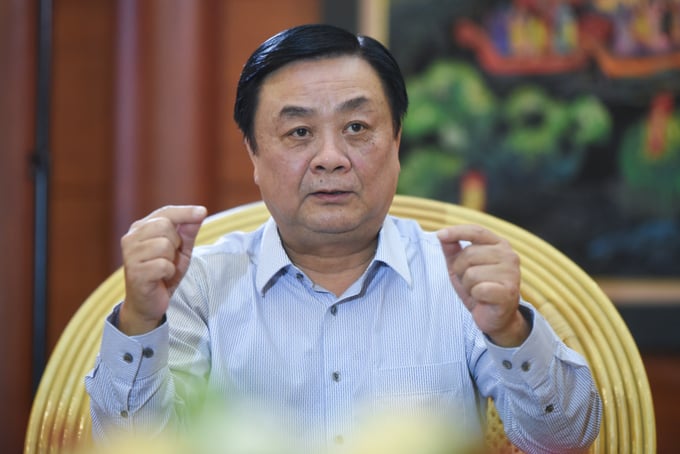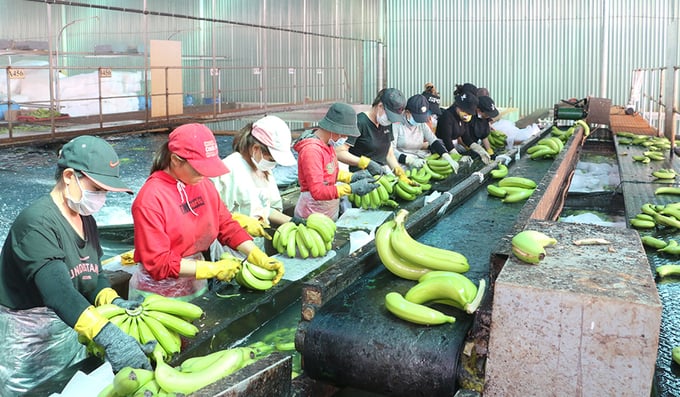May 16, 2025 | 10:40 GMT +7
May 16, 2025 | 10:40 GMT +7
Hotline: 0913.378.918
May 16, 2025 | 10:40 GMT +7
Hotline: 0913.378.918
In the last days of October, Vietnamese farmers joyfully welcomed the news that MARD had signed a Protocol on plant quarantine for the export of Vietnamese fresh bananas to China.
In tandem with the ups and downs of farmers, Minister Le Minh Hoan recognized the clear benefits for banana producers and the export of fresh bananas following the signing of the agreement.
"The protocol will assure authorized and sustainable exports of bananas, as well as price and output stability. This is also a chance for us to alter our agricultural economic structure to provide greater benefits for banana producers, as well as to manage and ensure the safety and hygiene of food for consumers " shared the Minister.

According to Minister Le Minh Hoan, the protocol will ensure the official export of bananas, stability, and sustainability, and at the same time ensure stable output and prices.
If farmers and businesses perform well, a reduction in plant quarantine checks at borders is an additional benefit of the signing. This would assist to accelerate customs clearance, hence reducing border gridlock.
In addition, when bananas are deemed "eligible" for official channels, this agricultural commodity will be standardized, encouraging large-scale production and making export operations more sustainable and long-lasting for exporters and banana-growing regions.
The Minister expected that over time, the network of banana producers, banana growers with packing facilities, and export businesses would become increasingly interconnected. The most difficult phase of the value chain is when a product's production is accepted by a billion-person market
"In accordance with the goal of expanding traditional markets, the agriculture industry has made significant efforts to negotiate and sign several export protocols. In turn, opportunities are created for farmers. Instead of trading in a single course, farmers may now consider cooperation collectively. The banana protocol acts as a catalyst to restructure production and systematize the organization "the Minister stated.
The majority of countries and domestic exporters agree that China is no longer an easy market. Minister Le Minh Hoan stated that if Vietnamese bananas dominate a market of 1,4 billion people, the country's agriculture would have greater experience and opportunity to reach and develop many more demanding markets in the future. His concerns were standardization, production chain, and market openness.

Protocol for banana is a catalyst for production restructuring and systematic business.
First and foremost, the commander of the agricultural sector urged individuals, cooperatives, businesses, and industry associations to join forces with state management agencies in order to alter mindsets and raise awareness throughout the entire society when Vietnam participates in the global supply chain in a greater capacity.
Banana exports to China have expanded regularly over time. In particular, the number of bananas subject to plant quarantine exceeded 430 thousand tons in 2020, 574 thousand tons in 2021, and 590 thousand tons in the first nine months of 2022. Statistics compiled by the General Department of Customs (Ministry of Finance) indicate that after eight months of 2022, the export value of bananas reached USD 237 million, an increase of 28% compared to the same time in 2021.
Vietnam's primary export market for bananas and many other fresh fruits is anticipated to remain in China. Vietnam's agricultural goods are regarded as competitive, particularly for fresh bananas, because the banana-growing area in the nation of billions is decreasing and production prices are rising.
As the principal agricultural production hub of the country, including rice, mango, durian, and dragonfruit, among others, the Mekong Delta is hesitant about banana cultivation.
With a total planting area of around 35,000 hectares, the majority of banana producers in this region are small-scale, dispersed, and domestic. It differs greatly from the vast agricultural regions of the Northwest and Central Highlands.

Banana exports to China will follow official channels after the protocol is available.
In locations regarded as the capital of Siamese bananas, such as the U Minh Thuong district in the province of Kien Giang, producers depend heavily on dealers for their income. When the price of bananas is high, farmers might earn between VND100 and VND150 million per hectare. However, if the price falls, the selling price is frequently insufficient to pay the expense.
Minister Le Minh Hoan emphasized that in order to make bananas a product with economic worth not only in the Mekong Delta but also nationwide, the parties must fulfill the conditions of the signed agreement. All banana-producing regions and packaging facilities shipped to China must be registered with the Ministry of Agriculture and Rural Development and approved by the Ministry and the General Administration of China Customs. Simultaneously, the developing region must develop a quality management and traceability system and implement good agricultural practices (GAP).
On the packaging facilities, investment and construction of a traceability system are required to ensure that all shipments of fresh fruit shipped to China can be traced back to the designated growing region.
To produce products that are of high quality, guarantee food safety and hygiene, and are environmentally and human health friendly. Minister Le Minh Hoan wants the local administration to advise the agriculture industry and citizens in compliance with the protocol's terms.
Additionally, gardeners are required to form cooperatives and cooperative organizations. Currently, the Ministry of Agriculture and Rural Development creates several community agricultural extension organizations at the grassroots level in the direction of "hands-on work" in order to provide farmers with official information sources. This creates a framework for restructuring, shifting raw material regions towards green, sustainable practices, in accordance with global consumption patterns, allowing individuals to improve their capacity to engage and communicate with enterprises.
"The Ministry of Agriculture and Rural Development is dedicated to allocating resources and directing the implementation standards for the growing region in full and in detail.
In addition to disseminating technical difficulties, we will integrate and share more market information and boost trade for farmers," the minister said.
China is a market with substantial purchasing power that is expected for capitalization by several nations and corporations. Unlocking the market's potential is difficult, but sustaining and exporting in a sustainable manner while increasing in value is even more challenging.
As with the export of many other agricultural items, fresh banana exports to China will first be viewed with uncertainty. With the care and coordination of the agricultural business and political system, however, farmers would escape market volatility and gradually become wealthy from their own gardens and fields.
Translated by Linh Linh
![Multi-channel, multi-directional Vietnamese agricultural markets: [7] Deep processing makes global reach easy](https://t.ex-cdn.com/nongnghiepmoitruong.vn/608w/files/huytd/2025/05/16/2946-che-bien-sau-chia-khoa-vang-nang-tam-nong-san-viet-tren-ban-do-the-gioi-080603_110-093858.jpg)
(VAN) The application of deep processing technology is helping Vietnamese agricultural products enhance their value, create competitive advantages, and open doors to conquer global consumers.
![Multi-channel, multi-directional Vietnamese agricultural markets: [6] Agri products go online](https://t.ex-cdn.com/nongnghiepmoitruong.vn/608w/files/content/2024/12/10/1-113313_954.jpg)
(VAN) Bringing agri products onto e-commerce platforms is an effective way to build a brand that many businesses, cooperatives, and agricultural production households are doing.

(VAN) Veterinary training should focus on quality, not just quantity. Veterinarians also need more options to pursue specialized training.

(VAN) The veterinary industry needs to be viewed objectively and further invested in to properly demonstrate its role and importance in the new context.

(VAN) The number of veterinarians graduating each year is not enough to meet actual needs, hence a difficult problem for the growing livestock industry.

(VAN) The strategic partnership between Cambodia, the Philippines, Vietnam, and CGIAR ensures that innovative solutions effectively address national priorities for food system development.

(VAN) This was affirmed by the UK Minister of State at the Department for Environment, Food and Rural Affairs during a working session with Deputy Minister Tran Thanh Nam on May 13.